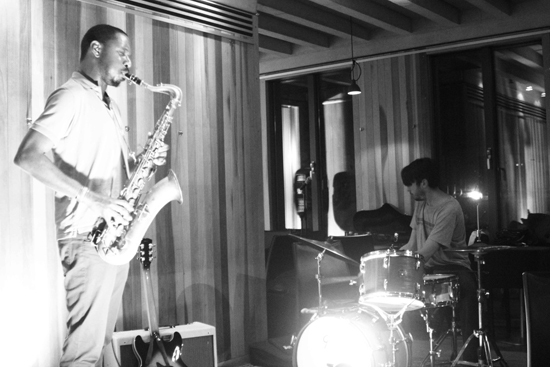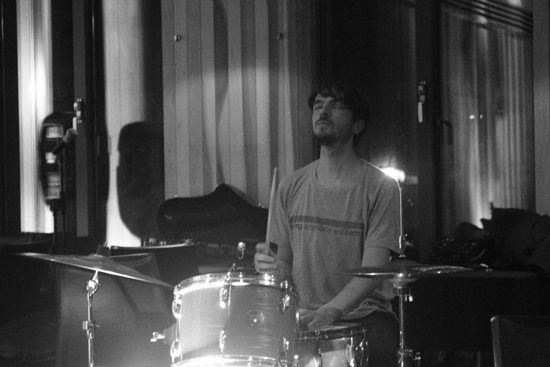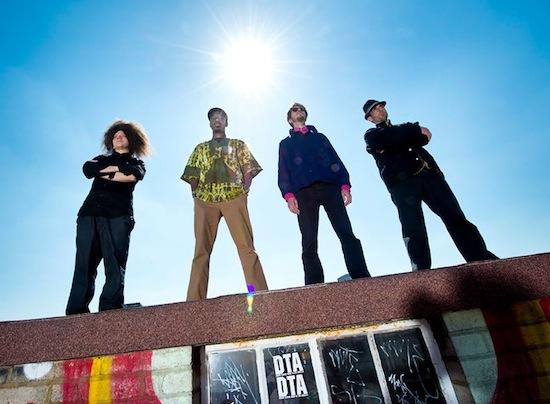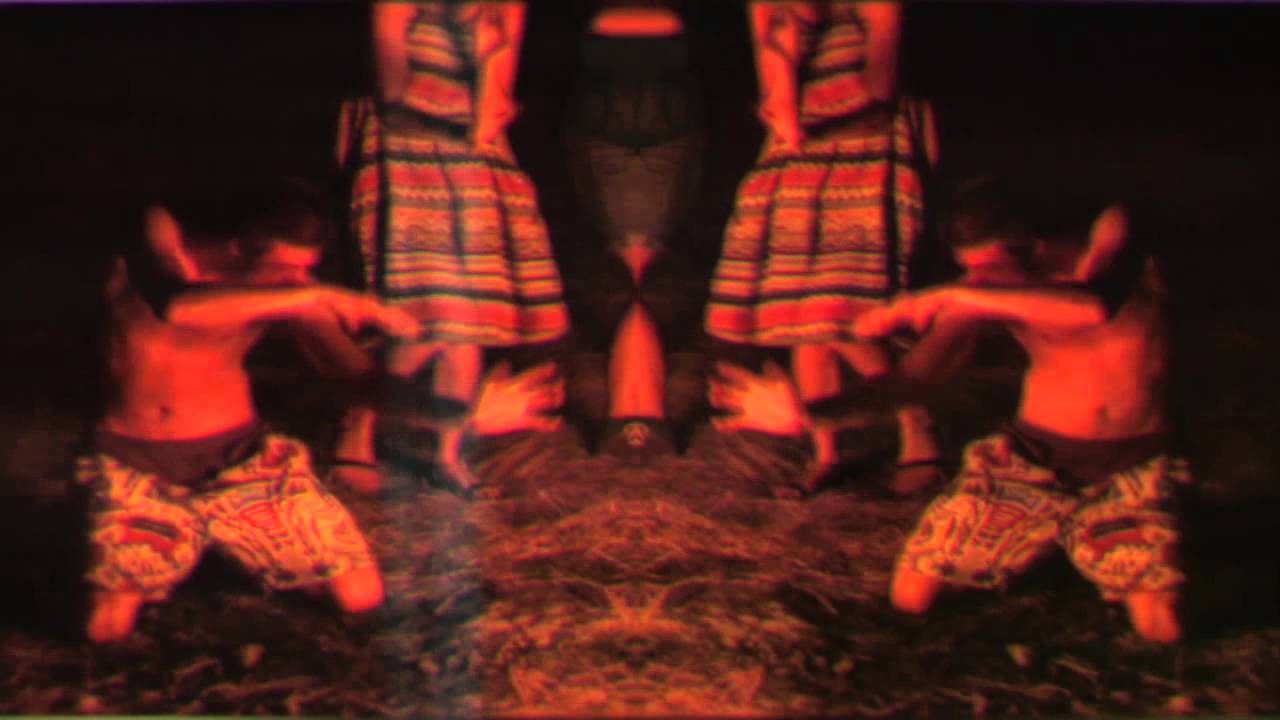Upstairs at The Forge in Camden, I’m being treated to the most intimate concert of my life. Shabaka Hutchings and Tom Skinner are freely improvising to an audience consisting of roughly seven people, most of whom a hadn’t re with the band. As a duo, they’re awesomely powerful, unexpectedly wielding their instruments with a calm, thoughtfulness and concern I hadn’t expected, especially considering that barely an hour earlier they were discussing with me the racuous, beat-ridden new album by one of the pair’s many ‘other bands’, Sons Of Kemet.
Skinner spends the set demonstrating an uncanny ability to find the beat in the most unexpected of places. Hutchings whips out a Barbadian ballad at one moment, while another sees him taking advantage of the intimacy to do little more than rhythmically depress the buttons on his sax. Earlier, Hutchings mentioned his fondness for the Quietus’ review of Colin Stetson’s New History Warfare, Vol. 3, released earlier this year, and this evening’s devastating demonstration of Hutchings’ own circular breathing ability pays apt tribute to Stetson. The two players seem almost clairvoyant, pre-empting each other and hearing the next move somehow before it’s made. Their improvisation is stellar, but it’s not why I’m here.
Sons Of Kemet’s Burn has quickly become a favourite of 2013, although that’s hardly surprising considering the musicians involved. Skinner and Hutchings have worked together on several fantastic recent projects, including Melt Yourself Down, Zed-U and Hello Skinny, and have both also worked independently with Mulatu Astatke, whose recent Sketches Of Ethiopia (featuring Skinner) has continued the Ethiopian composer’s ongoing latter-day creative peak. Tom Skinner also plays with the Owiny Sigoma Band, and is thus responsible for some of the most honest ‘Afro-pean’ fusion of the 21st century so far. Sons Of Kemet’s other members – second drummer Seb Rochford and legendary tubaist Oren Marshall – were sadly unable to attend, but both have equally daunting CVs. Rochford leads Polar Bear and drums for Acoustic Ladyland, while Marshall has played in just about every major orchestra in London and released several groundbreaking solo tuba albums.
Sons Of Kemet – like everything involving Hutchings or Skinner – are a varied, energetic and beguiling band. Burn is the sort of record that restores faith. Be it acoustic music’s ability to compel you to move, or the infinite number of possibilities from a set-up consisting of little more than drums and horns, or in music’s potential to unite people and cultures across oceans and against the odds – Burn revives the lot. The Quietus spoke to Hutchings and Skinner about how, why and where they do it.
I’d like to discuss how much or how little you think context can influence musicians. You’ve both travelled around a bit – Shabaka, you grew up in Barbados, and Tom, you travelled to Kenya with Owiny Sigoma Band – but you both also simply listen very widely to music from all over the world. What would you say has fuelled the homogeneity of your music’s assumed heritage?
SH: The interesting thing about this band is that all the members have a big drive to listen to music. It seems obvious, as we’re all musicians, but I can rely on Tom if I’m going through a patch where I don’t know what to listen to, to be checking out something that I’ve not heard before, or I can rely on Seb [Rochford] to say "check out this stuff", and there will always be stuff where I never even thought it existed. Some little kid in Detroit, or, something I’ve not really heard. I’m really into field recordings at the moment, Hugh Tracey recordings especially, which I can pass on to these guys, and we can all trade musical influences. I think that kind of affects decisions we make, musically.
TS: Not necessarily consciously, though.
SH: No, but it’s all ideology – what we decide to play or what not to play is always that kind of decision on some level. The amount of music we’ve checked out has to inform what decide to do, and what not to do.
Perhaps you also have an insight into the more literally physical influence of being in a place, surrounded by the music, and the difference between that and remotely listening to it. Does that difference exist at all? Could you get the same experience from deeper listening?
TS: Yeah I guess, in a way. But when you’re visiting a place, you undoubtedly get a purer experience. At the same time though, like on my trip to Kenya, we weren’t really particularly in search of anything. The first time we went, we didn’t really know who we were going to meet or what was going to happen. It was kind of by chance that we met the people that we met. Obviously that’s grown, and we’ve come to know that music. With Sons Of Kemet, Shabaka’s heritage is quite prevalent in the music as well.
SH: I kind of like the idea of taking things outside of context. I like the idea of us all listening to Afro-Caribbean music, but not necessarily being of that tradition, or growing up with it coming out of every stereo 24/7. I like what happens when they [Sons Of Kemet] interpret the music. I kind of listen deeply and go into it, but still we’re not the kind of musicians that do pastiches, so it just comes out as something else. I spent about four months this year in South Africa, and it’s really interesting in terms of context and music there, because it is very different. You hear the music – I’m a big fan of that tradition of South African jazz – and over there it kind of ‘makes sense’ in a way, in terms of the way people play, and the kind of energy in South African jazz music. But I like what happens when you bring that kind of energy to England. It’s not going to be the same.

Shabaka Hutchings (left) & Tom Skinner (right) at The Forge. Photo by Tristan Bath
Something that’s particularly interesting, particularly in your recent bands like Melt Yourself Down, Sons Of Kemet, Zed-U, is that it feels quite ‘London’ to me in a way, like lots of strands got taken out context and brought together.
TS: That’s been happening in London for many years now, really. For example, West Indian culture in London is strong, but it’s also as though they’ve been filtered through a different experience as well. Equally, like how we were talking about South African jazz musicians, in the 60s and 70s a lot of them came to London in exile.
Like lots of calypso musicians did too.
TS: Yeah. So in the history of British jazz or British music in general, there’s always been this kind of filtering through of different cultures.
SH: I think now especially is quite an interesting time, because it feels like there’s always been that kind of melting pot musical thing happening in London, but it feels like in this generation of musicians there’s been a turn, where they’re just like, ‘Fuck it, let’s not necessarily ‘do’ anything, we’re just going to play. If it turns out to be something to do with jazz, then that’s cool. If it doesn’t, that’s cool.’ Jazz musicians are all versed in the music we study, because we all go through the system so we all have a ‘jazz influence’, but then…
TS: The system is Babylon!
SH: Yeah! So we just play what we want to play. That questions of ‘is it jazz?’ just isn’t really relevant. If you go through the history of jazz, and look at what actual jazz musician have said – and not when journalists have, you know, misquoted them – most of the main musicians haven’t wanted the term ‘jazz’. Charlie Parker said explicitly, "I don’t want it called jazz". Duke Ellington, Miles Davis – all these people say "I don’t want to be called jazz". All the guys that we look up to just wanted music.
How musically educated are you both? What sort of role does reading and writing music play for you?
TS: Quite functional really. I can read music to an extent, but I’ve got a good ear and I’ve always just relied on that, and think that’s a better way to learn. Still, sometimes it’s necessary to write things out, have a chart, something that gives you a guide, at least to start with.
So you’re not literally sitting down and composing?
TS: I never really write stuff out. Shabaka wrote some stuff out for me.
Yeah I was gonna ask about that. There were some songs on Hello Skinny that were written by Shabaka, or so it says…
SH: They were jointly written.
TS: Yeah, essentially they were improvisations, which were sort of edited and produced. The starting point was just the two of us playing… so Shabaka wrote what he was playing I guess. It wasn’t ever anything that was written down.
SH: I kind of like that approach. It’s more like ‘I’ve got this material and I’m going to produce it’ as opposed to ‘I’m gonna write a ‘thing”. I’m kind of the opposite, but it’s not something I’m necessarily proud of. I’m the guy that gives you [points to Tom] the chart, but I know the guys will take it and do their thing. Like Oren will take it, and play it wrong. He’ll play it wrong so that he can get away from the music as soon as possible. I kind of like it. He’ll turn up to a gig and he’ll go, "I’m not using my music." I’ll go, "Have you learnt it?" He’ll go, "No. I’ll just play until I remember what’s written down." We had to do this show at the last [London] Jazz Festival, where I wrote a piece for an orchestra and Sons Of Kemet. It was kind of the opposite of what we do – really structured.
So everyone had a sheet of music?
SH: No. I kind of gave them instructions.
TS: First we didn’t have anything, and it was quite hard to get an idea of the geography of this twenty minute piece. So then Shabaka gave us something, not a very detailed score, but just like a guide as to what was happening and when. Equally, when [Shabaka] gives a new song to us, it’s pretty sketchy. Maybe some bass notes, or an idea for a rhythm.
SH: Yeah, with drum rhythms I just sing something at them. I’m not a drummer.
TS: Yeah, or send us a clip of something you’ve been listening to, and we try out something like it.
So the line-up for Sons Of Kemet – tuba, sax, two drummers – it’s not regular. Firstly, do you have any favourite ‘unusual lineups’, and secondly how did Oren Marshall get involved?
TS: Oren’s a bit of a legend anyway. I was first listening to Oren in my teens or something, but I didn’t really know who he was until some time later. He’s amazing to watch and listen to, he’s all encompassing physically, and he encompasses the music, becomes the music. Just hanging out with him and talking to him about life and everything is always enlightening.
There’s something really exciting about hearing the tuba in such a different context. It’s such a simple thing to just take a tuba, and play it like any other instrument instead of its traditional role, yet it opens up this whole universe.
SH: That weird thing is he can be a front man and actually play like a soloist, but then when he wants to he can go into the bass. You’ve got that rift between whether he’s just accompanying or whether he’s frontline. If he wants to be frontline when I’m playing… then he’s going to be frontline! There’s not much I can do when the guy with the tuba wants it.
The ‘chordless group’ thing is quite interesting, and it’s not done enough. You guys have done it quite a bit though.
SH: The thing is I don’t like chorded instruments, personally. The problem is, I call it the curse of Bill Evans with piano players. People just put their hands down. It’s one of these things where it takes so much effort to learn these voicings and ways of creating sound, that lots of piano players and guitarists do it whenever they have the chance. There are those that don’t, like Dave Okumu who plays on the [Sons Of Kemet] album, but I just find those chord players just put their hands down in the way that someone else did – and I’m not the guy who was playing with that other guy, so I don’t want to hear him. I find that without chords, it frees you up.
TS: Yeah, I love Ornette [Coleman]. Our music’s very different from that, but I love the openness of that sound. In terms of the tuba as well, lots of people say it’s unconventional, but the tuba’s been used in jazz from day one, in New Orleans marching bands. It’s always been there, and it’s actually in the roots of jazz.

So Tom, Hello Skinny seemed like quite departure to me. The name, the album and the titular cover version all point towards The Residents. How do they tie in with how the album came to be?
TS: I love The Residents, and don’t at the same time. I discovered their music a while ago and was blown away by a lot of it, but they’ve done a lot of stuff and I don’t like all of it. I just sort of joined up a few dots and it gave me a starting point – a name and that song. Other than that, I think my music’s quite different from The Residents really. I find their DIY approach and control of what they’ve done to be quite inspiring. Their music’s very visual and indicative of moods – I feel like I’ve taken that.
Where do you guys live?
SH: Camberwell. I went from Birmingham to Barabados, then back to Birmingham, then to London. Everybody lives in London.
Why London? Do you just have to?
SH: Yeah I studied, so you have to do your degree and then it’s just got to be in London. In terms of work for me, meeting musicians, hanging out, I couldn’t really imagine not being here. It is a struggle too, in that you work and you work and you work, and you come out essentially with nothing. It’s such a hectic life, and in terms of rent…
Everybody’s breaking even.
SH: Yeah, everyone’s just breaking even. But it’s worth it in terms of music.
TS: I grew up in Camden, just round the corner. This is my manor! It was great for me growing up, it was all just there, happening.
You were never tempted to move somewhere else? You’re in a profession where it could be quite easy to just uproot and move anywhere.
TS: I’ve definitely thought about it.
SH: And I’m going to do it. My fiancée is South African, so at the moment I travel backwards and forwards.

Shabaka, when do you choose to play sax, and when do you choose to play clarinet? The obvious answer would seem to be "when I think it’ll sound right", but how does that work? What fuels that decision?
SH: I see myself as a clarinet player who plays sax, that’s what I studied. I came up in the whole classical training thing. Generally I think of myself as a better clarinet player than I am a sax player, but because I don’t see myself as that good a sax player, in some ways it’s a release, in that I can just wiggle my fingers around and blow as hard as possible. Whereas on the clarinet, there’s something holding my music together – the ghosts of tradition, or my ex-clarinet teachers always watching me – that’s one of the factors. All my years of training do in some way stop it when there’s a tune that needs me to just let go, whereas on the saxophone no one’s ever said that. I’ve got nothing to live up to. On the other hand, I used to do the tune ‘Going Home’ [from Burn] on the sax, but playing it on clarinet just gives the tune some kind of eeriness.
Actually, some of the clarinet playing on Burn did instantly bring to mind Jewish music for me. The signature of that on the clarinet is much stronger to me than anything on the sax. Has that had an effect on you at all?
SH: Not directly, but two things have swayed me in that direction. One’s Don Byron – in his early days he did the music of Mickey Katz, a kind of really big Klezmer, Yiddish clarinet player, and I was really into that album and period of his playing. Then I’m also really into Ethiopian music, like Getachew [Kassa]… and we’ve both worked with Mulatu [Astatke], and in terms of inflections, there are some things that cross over. There are Ethiopian Jews. Yeah, I mean I wouldn’t ever say that Jewish music had influenced me, but when you get into it, it has.
That’s what I really liked about some of the tunes on the album. The variety bridges the gap between the Caribbean and, say, Israel, or Poland.
SH: That’s basically what I’m looking for. The reason I check out field recordings is to find the things that do link music together. Listening to the Hugh Tracey recordings from the Congo, you do see these elements from the Congo in all other music. There are tiny bits that are really similar to types of Caribbean music – from before spouge, calypso or anything of that was formed – and I like getting those cracks where you can see what’s happened.
How did the ‘Rivers of Babylon’ cover happen? For a lot of people that’ll always be a Boney M song.
TS: That’s my favourite track on the album.
SH: The thing is, I’ve never even heard the Boney M version. I’ve heard it more done in like, Rastafari ceremonies, and I link it more to that Rasta chanting and singing. My dad is Rasta, and I kind of link it to him and that tradition. When I moved to Barbados, it was a big song. For me, it’s got to be there, especially as we’re here, England… it is ‘Rivers of Babylon’ any way you look at it.
Tom, have you got any insight into what makes a good groove good? It’s basically what you’ve been doing for the last few years, with Owiny Sigoma Band especially.
TS: I don’t know, man. Everyone’s feel is different. Seb is amazing, but plays different to how I would do it. With Owiny Sigoma, a lot of the feel comes from Joseph [Nyamungu] and Charles [Owoko] – his drum patterns that he plays and the nyatiti, it’s very driving music. We have to keep up with that. Every beat has the potential to be a good beat, it just depends who’s playing it. There might not even be any drums on it.
SH: I’ve got something to say on this.
TS: [laughing] Go on then, tell me how it is!
SH: I’ll tell you how it is with you and your beats. I’ve realised that with Tom, a lot of what he does isn’t actually that complicated, but there’s a detail in the groove. Some drummers forget that the beat isn’t 1-2-3-4, the beat is the space in-between, the space between one and two, and there you emphasise. A classic example of that is the Thomas Mapfumo track, ‘Shumba’. Where it’s basically just hi-hat and bass drum, and when you get into it you can hear that hi-hat shifting around so much, but it’s not really.
TS: It’s locked.
SH: But within that lockedness, it’s…
TS: It’s human.
SH: Yeah, it’s somebody understanding that the beat’s not locked – it kind of moves, it’s natural – and Tom gets that. He also doesn’t do a lot of bullshit, and a lot of drummers do a lot of bullshit. Me, as a sax player, I do lots of that, that’s why I need two drummers that essentially drive – so I can do the wiggling. They give it a context and make everyone think it sounds good!
Where did the name Sons Of Kemet come from?
SH: It’s a long story, man.
Well, where did your name, Shabaka, come from?
SH: So basically ‘Shabaka’ originates from Mali, from the Dogon tribe. It means ‘God of creation’. But it was popularised by King Shabaka, who was an Egyptian ruler, the last Nubian Egyptian to rule both Upper and Lower Egypt, as opposed to the Arabs who sort of came in and dominated after that point. Shabaka, at his point of rule, he wrote all the teachings of the time on a massive big stone, which these scholars in the 70s found and started to interpret, and that became the foundation of what they would call Kemetecism. ‘Kemet’ was the name of Ancient Egypt at the time when Shabaka was ruling it, but Kemeticism wasn’t a thing, it was just the way that they chose to live their lives – or the rulers did, rather – and the general philosophy of that time. So when academics began studying the Shabaka stone, they formed Kemetecism as a sort of general philosophy.
In the time of King Shabaka, there was lots of intellectual trade between Egypt and Greece, which is kind of documented in a book called Black Athena, and obviously Greece was the foundation of Western thought. At the time I was reading lots of these things and thought that intellectually, we’re all ‘Sons Of Kemet’. And then I’m a son of Kemet, ’cause I’m Shabaka.
Sons Of Kemet’s Burn is out now via Naim Jazz



